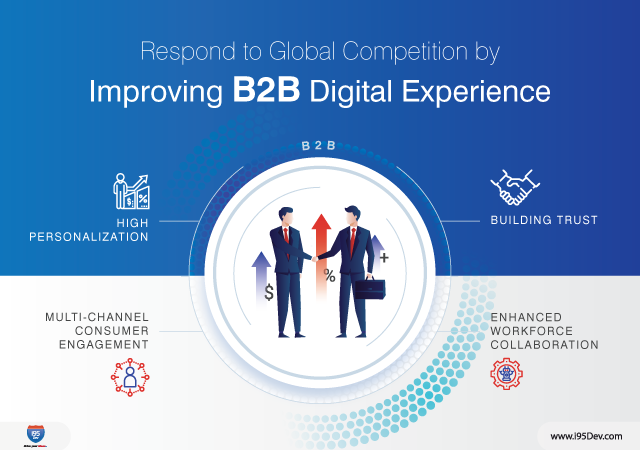Respond to Global Competition by
Improving B2B Digital Experience

Introduction
Unlike many B2C companies that have viewed digital commerce as an emerging sales channel, most of the B2B companies have viewed digital commerce as a secondary business unit that operated separately from their non-digital operations. However, with the world in lockdown, the negative economic effects of the global pandemic are hitting the business community at unprecedented speed and scale. The same B2B companies are now reviewing their views and strategies on digital commerce, as it has emerged as the most reliable communication channel, both internal and external, which can also drive revenues.
This change has been so profound that, today, even the B2B buyers expect their suppliers and manufactures to adopt digital technologies to generate deeper insights. They don’t just want product features and bundled services anymore, they expect highly relevant, personalized, and up-to-date information anywhere, anytime, and on the device of their choosing. Designing a B2B digital experience that lives up to their expectations requires addressing both the business and the emotional needs of the B2B buyers.
Changing Expectations of the B2B Buyers
The digital revolution in the form of social media, real-time recommendations on eCommerce sites, mobile, apps, machine learning, and AI, etc. have allowed everyday consumers to get what they want, whenever they want it. They have created a shift in expectations of consumers, resulting in a new kind of modern buyer. According to Accenture, 73% of the surveyed B2B company executives realize that consumer expectations are significantly higher than what they were a few years ago.
What B2B companies need to understand is that B2B buyers are very similar to their B2C counterparts when it comes to what they want. They want the same ease and convenience when researching, comparing, and ultimately buying products in the B2B space as they get when their consumers make purchases, digitally, while sitting at home. According to a survey by ITProPortal, 87% of B2B buyers said that digital solutions that mimic the B2C buying experience are the answer to meeting modern B2B buyer needs.
How Digital B2B Commerce is the Solution
1) High Personalization
B2B buyers expect their suppliers and manufacturers to anticipate their needs, make relevant suggestions, and deliver the right level of engagement across the entire buying journey. In fact, according to Accenture, 33% of customers abandoned business relationships because of a lack of personalization.
Digital commerce allows for personalized buying experiences. By utilizing data that B2B companies hold within their ERP systems, digital platforms can be customized to deliver relevant recommendations, content pieces, and opinions to the customer automatically to help them make better buying decisions. For instance, useful details such as inventory levels, past purchases, and add-ons for products previously bought – can all be presented to the customer neatly and clearly digitally, and aid them on their purchasing journey.
2) Building Trust
Buyers are held accountable by their companies for the outcomes of their decisions, so the B2B companies must help them create and deliver end-user experiences that drive adoption and value. Therefore, it’s not enough for B2B companies to merely stand behind their products. They also need to become partners to maximize the ROI for their buyers by delivering on promises and building trust across multiple functions, processes and technologies. Digitalization makes it easier to track consumer data and measure success while also enabling enhanced collaboration via seamless sharing of ideas and information and creating new solutions together.
3) Multi-channel Consumer Engagement
Today’s customer journeys no longer follow a linear path to purchase. They have multiple interactions with companies across multiple channels and expect a seamless conversational flow. B2B companies know that they can leverage digital technologies to enhance the omni-channel experience by making their engagement channel-independent at every touchpoint.
4) Enhanced Workforce Collaboration
Many times, B2B companies struggle because of poor integration across their teams, which disables the flow of information. To solve this, B2B companies can utilize digital technologies such as RPA and task managers, etc. that can break down silos. For their customers, this enhanced connectivity enables faster and more accurate responses, more relevant content, and better experiences along every step of their journey.
Conclusion
In today’s world, B2B companies have to implement a digital transformation strategy to enable their manufacturers and distributors to improve their consumer experience, thereby, enhancing the chances of retaining existing consumers and acquiring new ones. By continuously investing in their own digital solutions, these B2B companies can set a chain reaction that can inspire their entire value chain to embrace the new digital landscape and exceed expectations.




